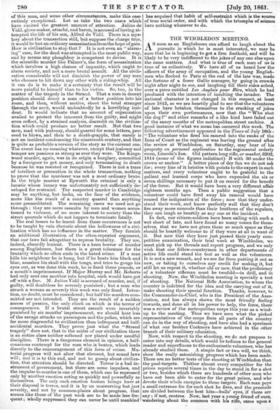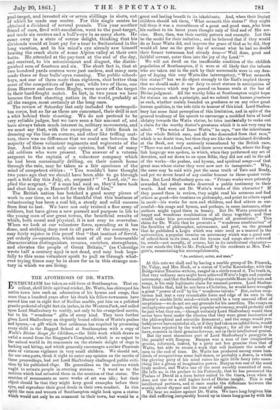THE WIMBLEDON MEETING.
11. pursuits soon as an Englishman can afford to laugh about the pursuits in which he is most interested, we may be sure that he is beginning to get a firm foothold, and will be likely to be very indifferent to the jokes of any one else upon the same matters. And what is true of each man of us is true of us collectively. We have all of us heard how the officers of the army of occupation, and the young English- men who flocked to Paris at the end of the late war, made the fortune of a fierce Gallic manager, by going in crowds night after night to see and laughing till their sides ached, over a piece entitled ie.? Anglais pour Rire, which he had produced with the intention of insulting the invader. The national character is not changed in this respect, at least since 1815, so we are heartily glad to see that the volunteers of late have betaken themselves to the cracking of jokes upon their own performances, now that the " Who shot the dog ?" and other remarks of a like kind have faded out of the saucy mouths of the metropolitan street urchins. A good instance of what we mean has occurred this week. The following advertisement appeared in the Times of July 16th: "The volunteer who fired his ramrod into the ranks of the Inns of Court as the regiment was leaving the ground after the review at Wimbledon, on Saturday, may hear of his property on personal application to the regimental orderly room, Lincoln's Inn. Old pattern long rifle, or musket, 3202, 1814 (some of the figures indistinct) B with 30 under the crown or anchor." A better piece of dry fun we do not ask for ; every line of it bristles with points to the expert in such matters, and every volunteer ought to be grateful to the gallant and learned corps who have expended the six or seven shillings necessary to put it on record for the benefit of the force. But it would have been a very different affair eighteen months ago. Then a public suggestion that a volunteer could have fired away his ramrod would have roused the indignation of the force ; now that they under- stand their work, and know perfectly well that they don't fire away more ramrods than their brethren of the regulars, they can laugh as heartily as any one at the incident.
In fact, our citizen-soldiers have been sailing with such a wet sheet of late, and have found so many voices for them- selves, that we have not given them so much space as they shoula be heartily welcome to if they were at all in want of it. But now that they have just passed their yearly com- petitive examination their trial week at Wimbledon, we must pick up the threads and report progress, and we only wish that our fellow-countrymen in other departments of active life could stand the test as well as the volunteers. It is not a new remark, and we are far from putting it out as new, or taking to ourselves any credit for making it, but still let us repeat it, whether old or new, that the proficiency of a volunteer rifleman must be twofold—in drill, and in shooting. Now, the Wimbledon meeting is specially a test of shooting. The National Rifle Association, to whom the country is indebted for the idea and the carrying out of it, make shooting their special function. Thanks, however, to the Commander-in-Chief, who is the President of the Asso- ciation, and has always shown the most friendly feeling towards, and done all in his power to help, the force, there was a review of the metropolitan corps this year as a wind- up to the meeting. Thus we have seen what the picked representatives of the corps from all parts of the country can do in the way of shooting, and have also had a specimen of what our brother Cockneys have achieved in the other branch of their military education.
Now, with respect to the shooting we do not propose to enter into any details, which would be tedious to the general reader and superfluous to the enthusiastic volunteer, who has already studied them. A simple fact or two will, we think, show the really astonishing progress which has been made. There are, no better tests of the shooting at Wimbledon than the pool-targets. Thither almost every competitor for the prizes repairs several times in the day to stand in for a shot or two, besides which there are hundreds of other men who have not been able to enter for the great prizes and who i devote the whole energies to these targets. Each pays a small entrance fee for each shot he fires, and the proceeds are divided between the best hits—bulls' eyes, if there are any ; if not, centres. Now, last year a young friend of ours, wandering about the common with his rifle, came upon a pool-target, and invested six or seven shillings in shots, out of which he made one centre. For this single centre he obtained a dividend of several pounds. This year another friend of ours, fired with emulation, went to the pool-target, and made six centres and a bull's-eye in as many shots. He came away in a state of serene delight, thinking that his dividends would at least pay for a tour to Switzerland in the long vacation, and in his mind's eye already saw himself beating the crack shots of some Alpine valley at their own butts. He attended at the pay-tent at the end of the day, and received, to his astonishment and disgust, the distin- guished sum of fourteen and six. The short fact is, that at two hundred yards centres were just useless, and many men made three or four bulls'-eyes running. The public school- boys, not one of them more than eighteen, shot better than most of the competitors of last year, while two of them, one from Harrow and one from Rugby, were never off the target in their hard-fought match. In fact, in two years we have become the first shooting nation in the world, probably at all the ranges, most certainly at the long ones. The review of Saturday last only included the metropoli- tan corps, but so far as these are concerned, their drill is not a whit behind their shooting. We do not pretend to be very reliable judges, but we have seen a fair amount of, and have always taken much interest in, military movements, and we must say that, with the exception of a little finish in dressing up the line on corners, and other like trifling mat- ters, there was no difference that we could see between the majority of these volunteer regiments and regiments of the line. And this is not only one opinion, but that of many old soldiers who were present. The answer of a veteran sergeant to the captain of a volunteer company which he had been occasionally drilling, on their march home through the rain, may be taken as a fair specimen of the mind of competent critics : "You wouldn't have thought two years ago that we should have been able to go through such a field day this July, eh, sergeant ?" "Lord, sir," re- plied the sergeant, "if a man had said so, they'd have took and shut him up in Hanwell for the life of him." The British nation has botched a good many pieces of work in our time, so let us be thankful that this business of volunteering has been a real hit, a steady and solid success from first to last. We have not only trained a fine army of soldiers, but have given a new pursuit and purpose in life to the young men of our great towns, the beneficial results of which, both moral and physical, it is not easy to overvalue. When we look at our volunteer force, spreading as it has done, and striking deep root in all parts of the country, we may fairly rejoice in this proof that "that instinct of fervid, yet orderly co-operation, which most of all our honourable characteristics distinguishes, secures, enriches, strengthens, and elevates the people of Great Britain," (as Coleridge wrote half a century ago) is not dead, and may look hope- fully to this same volunteer spirit to pull us through what- ever trying times may be in store for us in this strange cen- tury in which we are living.































 Previous page
Previous page